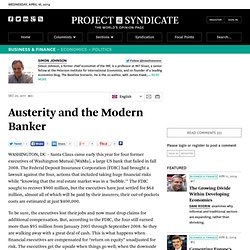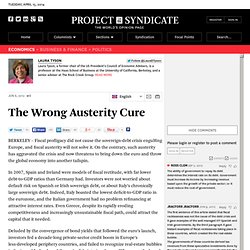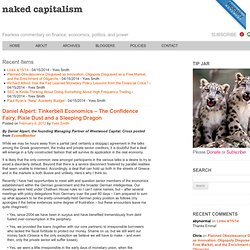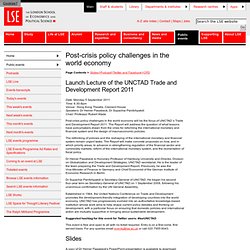

Austerity: Virtue or Vice? Austerity - the History of a Dangerous Idea - 05 - 2013. Government Department, comparative politics group public lecture Date: Thursday 23 May 2013 Time: 6.30-8pm Venue: New Theatre, East Building Speaker: Professor Mark Blyth Chair: Jonathan Hopkin Governments have advanced a policy of draconian budget cuts -austerity - to solve the financial crisis.

Austerity however is a dangerous idea that has time and again led to low growth and income inequality. "Austerity" marshals an army of facts to demand that we recognize austerity for what it is, and what it costs us. Mark Blyth is professor of International Political Economy at Brown University. Jonathan Hopkin is reader in Comparative Politics at the Department of Government, LSE. This event is free and open to all with no ticket required. From time to time there are changes to event details so we strongly recommend that if you plan to attend this event you check back on this listing on the day of the event. Twitter and Facebook Accessibility.
Austerity in practise: empirical evidence. Britain's experience with fiscal contraction. Austerity and the Eurozone: counting the cost. The Austerians' Practice of Dumbing Down the Debate Over Fiscal Policy: The-Gloves-Are-Off-Yes-I'm-Looking-at-You-Rudy-Penner Weblogging. The way to analyze whether, at the margin, it is raising or lowering government spending that is better for the economy right now is to do a benefit-cost analysis.

Following DeLong and Summers (2012), let the parameters for an economy at the zero lower bound of nominal interest rates and with anchored inflation expectations be: μ, the multiplier—and a depressed-economy zero-lower-bound multiplier, not a monetary- offset multiplier;η, the hysteresis coefficient: the shadow cast on potential output by today’s downturn;τ, the marginal tax-and-transfer share: 1/3;ξ, the deadweight loss from having to raise a dollar of extra tax revenue to service the debt;r, the real government borrowing rate (and the social rate of time discount); andg, the growth rate of potential GDP: 2.5%/year Then for each extra dollar of government spending today the present value of total economic output now and in the future changes by: μ(1+η(1+ξτ)/(r-g))-ξ(1-μτ) Austerity and the Modern Banker - Simon Johnson. Exit from comment view mode.

Click to hide this space WASHINGTON, DC – Santa Claus came early this year for four former executives of Washington Mutual (WaMu), a large US bank that failed in fall 2008. The Federal Deposit Insurance Corporation (FDIC) had brought a lawsuit against the four, actions that included taking huge financial risks while “knowing that the real estate market was in a ‘bubble.’” The FDIC sought to recover $900 million, but the executives have just settled for $64 million, almost all of which will be paid by their insurers; their out-of-pockets costs are estimated at just $400,000. To be sure, the executives lost their jobs and now must drop claims for additional compensation. At the same time, their actions – and similar actions by other bankers – are directly responsible for both the run-up in housing prices and the damaging collapse that followed. Some people argue that Americans need to tighten their belts. But what about government support for the big banks?
Austerity and its Discontents.
To sort.. "The Wrong Austerity Cure" by Laura Tyson. Exit from comment view mode.

Click to hide this space BERKELEY – Fiscal profligacy did not cause the sovereign-debt crisis engulfing Europe, and fiscal austerity will not solve it. On the contrary, such austerity has aggravated the crisis and now threatens to bring down the euro and throw the global economy into another tailspin. In 2007, Spain and Ireland were models of fiscal rectitude, with far lower debt-to-GDP ratios than Germany had.
Daniel Alpert: Tinkerbell Economics – The Confidence Fairy, Pixie Dust and a Sleeping Dragon. By Daniel Alpert, the founding Managing Partner of Westwood Capital.

Cross posted from EconoMonitor While we may be hours away from a partial (and certainly a stopgap) agreement in the talks among the Greek government, the troika and private sector creditors, it is doubtful that a deal will emerge in a fully constructed fashion that will survive its application in the real economy. It is likely that the only common view amongst participants in the various talks is a desire to try to avoid a disorderly default. Beyond that there is a severe disconnect fostered by parallel realities that seem unable to intersect. Accordingly, a deal that can hold up both in the streets of Greece and in the markets is both illusive and unlikely. Recently I have had opportunities to meet with and question senior members of the economics establishment within the German government and the broader German intelligentsia. In other words Tinkerbell Economics. 1.
Austerity and Ideology... Post-crisis policy challenges in the world economy - 2011. Launch Lecture of the UNCTAD Trade and Development Report 2011 Date: Monday 5 September 2011 Time: 6.30-8pm Venue: Hong Kong Theatre, Clement House Speakers: Dr Heiner Flassbeck, Dr Supachai Panitchpakdi Chair: Professor Robert Wade.
